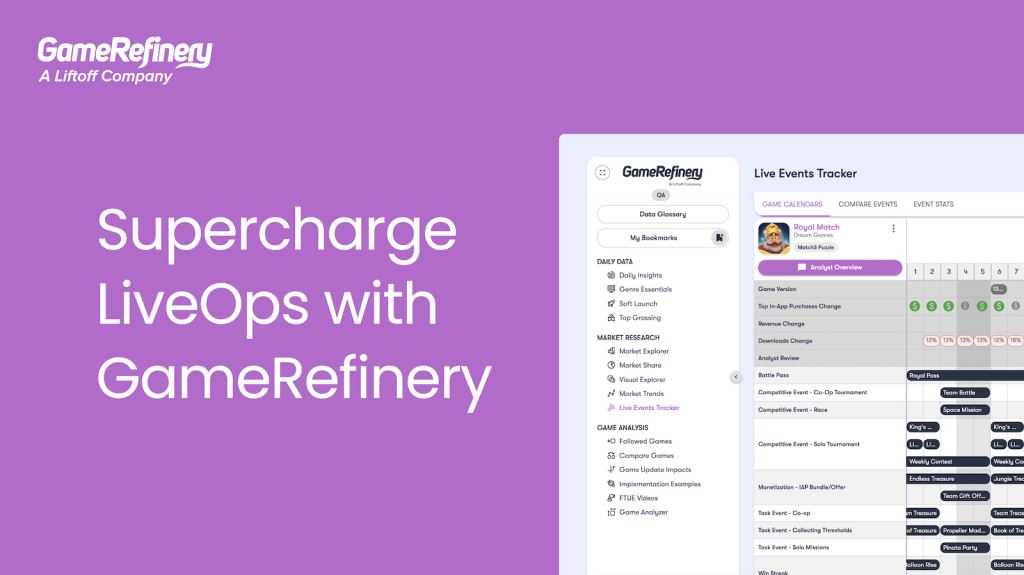Is there room for others to succeed in a market dominated by so few companies? Join us as we explore the current state of the mobile shooter market, the top games dominating the market, their market shares, and the different types of shooters available.
![]()
![]() Spotify, BuzzSprout, TuneInRadio, iHeartRadio
Spotify, BuzzSprout, TuneInRadio, iHeartRadio
– If you enjoy the episode, remember to hit subscribe!
You won’t want to miss our overview of games like CoD: Warzone Mobile, Arena Breakout, Undawn Vitality, Division Mobile, Destiny Mobile, and Valorant. We’ll also explore the recent game cancellations from EA, including Apex and Battlefield, and examine, amongst others, the intensity of live-ops for the top shooters, content cadence, and possible entry barriers for new companies. Looking to the future, we’ll delve into where the market is headed and whether there is room for new shooters and subgenres to emerge and take the market share.
Learn about the challenges that mobile game developers face when trying to develop shooters. We talk to the Chief Game Analysts at GameRefinery, a Liftoff company, Wilhelm Voutilainen and Erno Kiiski, who provide us with a comprehensive analysis of the state of the mobile shooter market and tell us what we can expect in the months and years to come.
Read transcript
Introduction
[00:00:00] Jon Jordan: Hello, and welcome to the Mobile GameDev Playbook. Thanks for tuning in for another episode. This is a podcast all about what makes a great mobile game, what is, and isn’t working for mobile game designers, and all of the latest trends.
I’m Jon Jordan, and joining me today, we have two familiar faces. We have Erno Kiiski and Wilhelm Voutilainen, both Chief Game Analysts at GameRefinery by Liftoff. How’s it going, guys? How are you doing?
[00:00:25] Erno Kiiski: Hi, Jon. It’s good. We’re good. How are you?
[00:00:29] Jon: Yes, good. I see the sun in Helsinki.
[00:00:30] Erno: Yes, finally. That’s only one day of winter, almost.
[00:00:37] Jon: Sun in Manchester as well.
Anyway, we’re going to talk today about– I don’t think as we’ve not discussed it recently, I think. I think we’ve got plenty of stuff to discuss. We can talk about what’s going on with mobile shooters. I guess it’s one of those genres that took a bit of a while to get to grips with touch screens. Then, there was a big explosion, obviously, PUBG, and then later, Call of Duty.
A whole bunch of other stuff going on and some interesting trends, so we can dig down into that. I think, Erno, you’re going to kick us off with what are the headline trends that have been going on in the market.
Shooter market overview and trends
[00:01:09] Erno: Of course, what we want to discuss, or maybe the most recent topic or big, big topic, is definitely what EA did with their mobile shooters. The Apex Legends game, which was less than a year old, they decided to cancel it and close it down. Then, they had the Battlefield Mobile under works and totally cancelled the whole project. We’re going to discuss maybe a little bit more on the future, or the upcoming topics.
That’s definitely, if you look at the big news, big trends in terms of the shooter market, what is been around, and probably, actually, one of the reasons why we wanted to have this discussion because, overall, the market is tough, but in the shooter genre, it’s no different, as we can see for these games, big massive IPs, big projects, but still they decided to can them overall.
I think maybe a good starting point just to get us started would be to talk a little bit about what the market actually looks like at the moment. Of course, we have discussed this many times, and the big changes, there haven’t been that many big changes.
Let’s kick it off with the market-level overview. If you’re looking at, especially, the Western shooter market at the moment on mobile, it’s pretty much three games dominating the market. About 80% of the market share in the West is now going to Call of Duty, PUBG, and Free Fire. The top three dogs own a big, big majority of the market. Then, the rest, behind that, about 20% of the market is much more evenly divided. There are few percentage market shares for some games and so on, and down from there. There is a clear categorization of the big three and the rest.
One actually very interesting factor is when we look at the current market, and especially now when Apex is now out of the picture, is the type of games, and especially, the business model of these games. These top three, of course, are these competitive PvP shooters with cosmetic monetization, cosmetic economy, selling skin, and selling all that stuff.
Then, if we look at the rest, the top 20 shooters. Basically, the rest of the 17 shooters that are in the top 20 performing in terms of the IAP revenue, in terms of the shooters, actually, all of them have some kind of a power progression. There are different ways that it has been implemented. There are some things that you either collect characters, or you upgrade them, some lightweight, Brawl Stars and all that stuff type of, like a lighter power progression meta.
Then, there are games like War Robots, which is actually currently the biggest shooter after this top three in the US iOS market, at least. The game has about 3% market share. If you look at that game, how that game works, it’s all about collecting the robots, collecting the equipment items for them, and upgrading them. Pretty much an RPG type of meta with the upgrade layers, and selling the power, so to speak.
That is, of course, how the market is. In order to make that cosmetic economy work– Well, we’re going to talk about LiveOps in the second part, but there is a crazy amount of LiveOps. Then, overall, crazy, crazy big audience, because if you don’t have any power progression, if you compare revenue per download numbers, even for these top shooters, they’re actually– Like Call of Duty, it’s much lower than, let’s say, War Robots, for example, because of the nature of the business model.
It’s interesting that we have the top three that are dominating the market. Then, similar cosmetic monetized games really haven’t found their footing, or haven’t been able to operate the game as efficiently to make that business model work in that market.
Free Fire’s hybrid approach
[00:05:36] Wilhelm Voutilainen: Yes, I agree. I think the big learnings here are that, if you are a shooter, if you want to make a shooter with just cosmetic economy, it’s going to be really hard to compete against these three giants called PUBG and Free Fire. Then, maybe it will be better to try to find learnings from the shooters in the 100, 200, and 200 to 500 grossing range. The games Erno mentioned, like War Robots, are a really good example.
Many of these old masters have been there in the quite high grossing ranks for a long time, Games like Mech Arena, War Machine, World of Tanks, Sniper 3D, the top sniper game right now, and also one of the top pure FPS games, Pixel Gun 3D is also a really old game, but still doing pretty well, and almost in the top 200 grossing ranks as well. Zooba is another example.
I think out of those top three games, the top three giants, Free Fire is a really interesting case because it’s like this hybrid between cosmetic monetization, and this power progression that the rest of the games have because it has a similar monetization, really super heavy LiveOps cadence, cosmetic monetization similar to the COD and PUBG. On top of that, it has this character collection layer, and this power progression too.
You can upgrade those characters as well. That’s a really interesting hybrid. I think when you look at the revenue per download numbers, Free Fire is not getting nearly as enough or nearly many downloads as COD and PUBG, but it’s still in the making the same amount of, or still in the same grossing ranks as PUBG, for example. The revenue per download is so much higher in Free Fire. Maybe one reason could be that they are utilizing a bit of this power progression as well.
[00:07:44] Erno: It’s interesting.
[00:07:45] Jon: Yes, it is interesting.
[00:07:46] Erno: I just wanted to mention, on the Free Fire, like Wilhelm mentioned, it’s this at face value. It doesn’t even unless maybe for the super casual player, it feels like any other PUBG or whatever type, where it is totally cosmetic. Then, for the hardcore players, it actually starts to matter. Then, there is more a reason for conversion for the skins.On the other hand, like I said, that might push a lot of players away as well. This is why games including Call of Duty most likely have, especially in the West, a much, much bigger audience, and they’re doing okay with the smaller revenue per download. It’s interesting. Totally, at the face value they’re similar, but then if you go a bit deeper, they’re a little bit different in the way of operating the game.
EA’s decision to kill Apex Legends Mobile
[00:08:38] Jon: I guess one of the issues here is, you have to be very careful how you position yourself in these games when it comes to play to win. Obviously, in battle royale, the whole point of it is the purity of the skill. If you’re taking that battle royale element, which obviously, PUBG does, then it’s much harder for you to build those power progressions into what’s going on. Obviously, you can do it, but that’s something the audience is going to probably a bit more sensitive to than some of these other games.
There’s one thing I was going to say coming back to EA’s decision, how much do you think the trends you set out will play into their decision? Obviously, I get a little bit is, what’s happening within EA, and how they want to allocate their resources to the various different games they’ve had.
I wonder how much of it is to do with Apex and Battlefield, and how they fit into this power monetization versus cosmetic monetization. Do they feel like they can’t compete against the big three, but they can’t get the monetization that they want to as well? It’s not really about those products, it’s just about the market, rather.
[00:09:17] Erno: Yes, it’s tough, and it’s hard to say what are the very, very underlying reasons that when to introduce them, why Apex never really was able to be the same type of success. If you think about Apex, for example, at first, the idea was exactly the same monetization model as Call of Duty, the same type of things. If we think about Apex, first of all, a hero-based shooter, you’re selling skins for specific heroes, which already restricts your possible monetization of the cosmetics already quite a bit.
Then, naturally, the second point that we are going to talk about, it’s LiveOps. Of course, I don’t have specific numbers of LiveOps for Apex actually, but in terms of the crazy amount of cadence that these top three are pushing, and then when these are already established games that people have bought the skins, and they are connected to the games.
A good example could be, PUBG, Krafton who tried to make the PUBG: New State, which didn’t work out at all, almost. I think it’s still live, the game, but it’s nowhere near PUBG Mobile. Krafton tried to make their own thing. In my opinion, the core gameplay is a polished version of that, but it’s not enough in these types of games. How do you get those players out from the PUBG Mobile that have been playing for years and years, and have already got a lot of skins?
If you look at their live operations, how they’re pushing content and collaborations, and all that stuff in PUBG Mobile. In comparison, the New State, that it’s a much, much more stale type of experience. It’s tough. It’s a good question, in terms of what’s the reason. I’m sure Apex and Battlefield are both big IPs. Apex also, they went for full cosmetic monetization.
If you look at the revenue numbers, especially, if I look at now US iOS, Apex Legends never made it over $1m, for example, which is very, very, very, very tough. They were never ever able to crack the monetization, even though they had a similar idea, similar mechanics, similar gacha mechanics, and all that stuff. Whether it’s then the number of contents, the content cadence that they were pushing, didn’t they have enough engagement content, limited-time game modes, types of things to play around, and show off your cosmetics? That’s a good question.
It is super tough, especially for it to compete against these top three that are already established, and have an audience. Actually, Apex is also a little bit different with the hero approach, but it is still a battle royale shooter, like all of these top three. Call of Duty has a little bit more emphasis on the other type of shooters as well, but still very, very similar. If you look at it on a high level, what kind of a shooter experience it is.
[00:13:21] Wilhelm: Wasn’t it that Free Fire‘s revenue per download was $30 right now?
[00:13:27] Erno: Yes. Of course, it’s been around for so much longer than Apex, but it’s interesting when you look at a side-by-side grab, how Free Fire is so distinct even from PUBG and Call of Duty Mobile. Is it the business model that definitely has something to do with it selling the small power, in terms of being able to monetize more strongly? Then, like I already said, it doesn’t work out with some specific audience, and I think the Call of Duty brand wouldn’t have worked out, so.
[00:14:07] Jon: No, and I guess from that point of view with Apex and Battlefield, both being quite Western-focused brands, you can’t leverage that power mechanic in there. Obviously, Free Fire is much more Asian Pacific emerging territories, where they’re much more open to that thing. That’s a good analogy. Probably, a sensible move by EA to not be wasting money, because it can never get the audience of the other three. Obviously, EAs broken, so even if they had tons of money to spend, they can’t grow the audience, so let’s just wash their hands of that, and move on, I suppose.
[00:14:36] Erno: Exactly. Most likely, definitely those points. As I said, the amount of money that is required to operate, we’re going to discuss next the LiveOps. The amount of money required to push the amount of cadence of content to be able to compete is super high, and then if you are not able to get that money back, it’s quite clear, only one decision can be made.
[00:15:04] Jon: It’s just somewhat ironic that EA has been trying to make Battlefield mobile games for around 10 years until every time they get cancelled. Anyway maybe in the future. Let’s move on to LiveOps then. LiveOps is the bit where mobile games really work. What do studios have to do? What’s the same, and what’s different to other genres?
What does the LiveOps of top shooters look like?
[00:15:26] Erno: Well, if we start with those, which are basically the market at the moment, over 80%, those top three. We are actually– Our recent product, it’s going to come really soon. Been under work for a long time. It’s actually about on GameRefinery, it’s about LiveOps, and actually LiveOps tracking, and doing competitive research on, especially, LiveOps. We’ve been now following these top three shooter games for a couple of months, and I can give you some numbers, in terms of how insane the amount of content is.
[00:16:05] Jon: The inside scoop.
[00:16:06] Erno: Yes, exactly.
[00:16:08] Jon: Cool.
[00:16:09] Erno: If you take Call of Duty as an example, what do we have in terms of the operations in that game? Of course, we have the ranked seasons, which all games have, which brings the competitive ladders, where you compete and there are unique rewards for rising high in the rank seasons, and so on, and they are all three months long.
Then, there are of course one-month-long battle passes, and tons of content from there. Every month, you can progress. Every weekend, they have a specific tournament. They implemented it about maybe a year ago. This a tournament mode, which has also its own seasons every week, and you can play specific modes, and earn specific rewards.
Then, if you look at just limited-time game mode, so different items, lots of twists and stuff like that to the different gameplay modes, and then you can enter from a different playlist to play those. There are usually three to five active at once, and usually, they are only a few weeks long or something like that usually. Then, that’s supported with tons of tasks and events, and you can earn cosmetics from there.
Then, that’s just the engagement side. Then, if we look at the monetization, in Call of Duty Mobile, there are usually around 10 limited-time gachas at once active. They are usually about three to five weeks in length, and then in one gacha, there can be from 10 to 30 different unique cosmetic items. If we start to count the amount of cosmetics, first of all, that they are pushing on a weekly basis, and of course, the gameplay engagement content. All those looping things like the ranked stuff and so on, but also the limited-time gameplay mode should bring some variety. The amount of work to operate this game is insane.
[00:18:10] Jon: I guess it’s worth pointing out that. Well, correct me if I’m wrong, but most of that LiveOps, if not all of that live, is happening out of the Chinese developer, is it not?
[00:18:19] Erno: Yes.
[00:18:20] Jon: That’s, I’d imagine, well into three figures in terms of the amount of staff running that. Probably, maybe more than a few hundred maybe, but certainly that scale, it would be almost impossible for Activision to run that in North America.
[00:18:36] Erno: Exactly.
[00:18:36] Jon: It’s pretty scary.
[00:18:38] Erno: Then, if you compare, I have had one data point from Apex Legends, we did this, it was maybe three, four months ago, so it’s not super fresh, but as an example, in terms of the monetization content. Apex Legends also had three limited-time gachas, usually at once, with about the same amount of content per gacha available. Still, in terms of the pure amount, it’s much, much less than in Call of Duty Mobile.
Of course, it’s just the volume, but still, it already gives a little bit of data point, in terms of, was there enough, they couldn’t operate. It was interesting because EA was working with Lightspeed & Quantum, and Tencent Studio which made PUBG Mobile in terms of their live operations. You could see a lot of correlations in their live operations as well, but still, was it too expensive? What kind of a deal they had?
We don’t know what’s behind the scenes, so to speak, but it never really flew out, or then overall, just the amount of content for that type of basic core loop that they had for a hero-based shooter didn’t just work out. They are interesting things, because, yes, these games, they’re all about LiveOps as you can see from the amount of content.
[00:20:02] Jon: I think they did point out when they cancelled it, there was mention of a few things, but one of the things was the whole future content pipeline. They just felt they couldn’t get it to the quality they needed, which maybe talks a little bit about that. There is a quantity thing that, if you do these things properly, you just have to put out a ton of stuff.
Then, obviously, if you have that at a very high level of quality, and if you’re doing a hero shooter, that’s slightly different, because heroes are the focus, rather than the skins, as it’s a slightly different thing going on. You can’t just be creating and releasing new characters all the time, because that messes up everything. You end up in a difficult structural position.
Understand the game you’re making and how that feeds into LiveOps
[00:20:35] Erno: Yes, exactly. Especially, for this type to try to compete against this top three, and if that’s the LiveOps machine you are trying to beat, it’s a tough, tough, tough job. Then, what is the way to do this? Is it maybe try to bring something totally unique in terms of the core gameplay maybe, or then a different approach, like what Brawl Stars did, like make a little bit of casual shooter, and this kind of game, It has a power progression, but it’s not that heavy that it would feel super unfair, for example.
[00:21:05] Wilhelm: I also think the Zooba that we mentioned earlier. Of course, it’s not in the top 50 or top 10 grossing ranks, but it’s still doing quite well in the on and off 200 range. We are also tracking LiveOps of Zooba, and it’s nearly not that heavy in terms of that. Zooba is similar to Brawl Stars, in that it’s more of this casual kind of battle royale game. They have found success that way. Making a bit more of a casual type of shooter. They don’t need absolute massive LiveOps cadence to be successful in that sense.
[00:21:46] Jon: I guess, obviously, the more people you’re putting into LiveOps, the more you’re dragging down your profit. The PUBG, Call of Duty and Free Fire people, they’re always, “Oh, how can we get more LiveOps up in this?” They’re always adding more people, so there’s, I guess, there’s always an equilibrium of profitability where people think, “Oh, we can invest some more and make some more money,” but then everyone’s doing the same thing.
They end up in the same situation, but definitely as you’re saying, Wilhelm, picking and choosing, and understanding what you’re trying to make and understanding the game you’re going to make, and then how the monetization, and how that feeds into LiveOps.
Are your LiveOps teams going to be 10 people or 100 people? There’s quite obviously a massive difference there in the scale of operation you want to do. If you only got 10 people to run your LiveOps, and then there are some sorts of games you just can’t make, then you just have to admit that and choose your battles. We’ve set it up as there’s these massive two or three giants fighting out, and everyone else is scrabbling right in the bottom. There are always new games coming up, there’s always people with clever ideas of how to solve this.
How do we see the next year panning out? There are obviously some fairly big IPs that are coming. Maybe not this year for some of them, but where do you see the opportunities in this?
What does the future of the shooter market look like?
[00:23:01] Wilhelm: Definitely. We’ve been talking about these three top shooters, and they were all battle royale games. There could definitely be space for other kinds of shooters and finding success that way. When we look at, for example, in the West in the PC, we have hero shooters, we have extraction shooters like Escape from Tarkov, a really successful game, more of these tactical FPS games like Counter-Strike or Valorant, and then we have these RPG like looter shooters.
Possibly, especially, when we look at the upcoming shooters, we could definitely see some interesting new mobile shooter sub-genres merge on the mobile as well, and find success that way.
[00:23:49] Jon: Do we want to throw out some titles? To entice people with games you want to be looking out for?
[00:23:55] Erno: Yes. Well, for example, talking about extraction shooters, I think Arena Breakout is a really interesting case. That’s a game right now in the China market. It’s actually in the top 50 grossing. It’s been doing quite well. It was recently released there. That’s like this extraction shooter game. It’s basically how those work exactly like in Escape from Tarkov on PC.
You already know it’s not about royale, it’s not like this FPS shooter when you die, and then you respawn instantly, but basically, you go into this area for, let’s say 30 minutes. You shoot other people, you shoot other players, you shoot PvE mobs, you loot stuff, and then you need to extract with the loot that you gained there, and then you keep the loot. The Arena Breakout, and also it’s coming– I think it’s right now on the closed beta in the US as well. Apparently, it’s coming to the US soon.
What I think is really interesting with this game, as we’ve talked about these monetization models, is that we have the cosmetic monetization, we have the power progression. Arena Breakout actually has totally unique monetization model. You basically purchase stuff, you can purchase equipment items, and you can purchase upgrade items to that equipment, but the thing here is that you basically have to take that equipment with you to the matches, and if you die, you will lose them.
Basically, you can actually lose the stuff that you purchase. Now, that’s also used to monetize these inventory boxes. You can rent this inventory box, you can take it with you to the match, and you can put stuff inside there. If you die, then you will not lose them, and there’s also this subscription plan tied to it as well. It’s been working quite well for the game.
[00:25:45] Jon: I think also they have a marketplace, don’t they? There appeared to be a marketplace where people are trading stuff, including items as well. They’ve thought quite a lot about the economics of what’s going on. Sorry, I know I interrupted.
[00:25:58] Erno: No problem. That’s actually interesting. I haven’t got really deep into it yet, but that’s interesting that they have peer-to-peer as well. Because, in a way, that’s one of the strategies. It’s like selling insurance, so to speak. Insurance monetization for a game. It’s an interesting way.
It’s working quite well, at least, so far in China, but then of course, again, talk stuff to pay to win and all that stuff in the West and how well it’s received when it comes, will remain to be seen. Especially, now with the constant talk also about gacha monetization, which these top shooters are relying on cosmetic monetization, that game doesn’t have any gachas, for example, in their monetization model, which is an interesting thing to study, in terms of that as well.
Overall, I think those extraction shooters are interesting. To be honest, they have been talked about for a while already now; when they’re coming to the mobile? Are they coming? Do they find success, and so on? The most interesting thing for me about them is that, if you think about these competitive PvP shooters, it’s match-to-match. Of course, you have maybe had a Battle Pass or ranked season that gives you this little bit of a long-term progression.
Then, in these extraction shooters, you actually have, not necessarily power progression in the same manner as RPGs or some of these shooters, but it has some kind of a long-term progression vector that ties the match together and brings that connection for the players that might also work as extra retention push for the players, which has been lacking a little bit in these top shooters.
It’s very, very interesting to see when finally these games start to come out. Like Arena Breakout, it’s a very, very high production-value game from Tencent. How is it received in the West, or is it still? Escape from Tarkov is a relatively big game on PC, but it’s still a niche compared to Call of Duty, for example, so it remains to be seen how that genre pans out.
[00:28:00] Jon: I guess going back to one of our original statements was, it is going to be relatively niche, although you can’t judge exactly how. It could be a big niche or a small niche, but obviously, the monetization for the people who like those hypercompetitive risk-reward games is going to be, probably, off the scale. It’s whether they can balance monetization with making the audience as big as possible for them.
It’s very interesting. I was looking at it. It’s a very complicated setup, where you can customize the entire UI of all these different moves and weapons and things. You can really see that some people are going to absolutely love the level you can get into to customize your loadout and your UI and stuff.
[00:28:39] Erno: Definitely.
Upcoming releases to keep an eye on
[00:28:42] Jon: We’ve got, obviously, Valorant, probably not coming out this year, or it seems definitely not coming out this year, so that’s maybe one to park, but I guess everyone is going to be excited even if it’s \coming out till 2024.
[00:28:53] Erno: Yes, it’s an interesting game. Yes, I could go. Well, as Wilhelm mentioned earlier in this podcast, the top three competitive shooter games, they are really from the same formula, so to speak, even with the nuances and differences, but then there is a little bit of room, at least in terms of success.
I don’t know. It might be. There had been some games that had tried a little bit this type of shooter, but then maybe this was a little bit slow-paced tactical five-versus-five, more like Counter-Strike, Valorant, this type of an approach. How well it works on mobile? We’ll see. Is it a little focused mobile audience, which is maybe a little bit more casual in terms of their gameplay maybe, than most of the PC audience, for example, so will it find its audience? At least, that is the thing that I don’t see Valorant being as a direct competitor to let’s say PUBG Mobile, than for example, Apex was.
[00:29:03] Wilhelm: I think as Erno mentioned, the sort of those Valorant Mobile, and these sort of more tactical shooters being more slow-paced. I personally see that as a possible strength when these sorts of tactical slow-paced shooters come on mobile, and I think Arena Breakout also. It’s more slow-paced. It’s not like it’s a super hectic battle royale, so that could actually work pretty well on mobile. If you make it even more like it, a little bit may be a more casual way.
I think that it’s good that there could definitely be a success for Valorant. For example, I’ve analyzed Critical Ops on mobile, and I personally think that it plays really well because of that more smooth and slow-paced tactical combat.
[00:29:44] Erno: Yes, it’s interesting because it’s an old game, but of course, coming from a very small Finnish studio, which doesn’t, of course, have the LiveOps capabilities of, let’s say, Riot maybe. With what they’re able to do, for example. Of course, on mobile, it’s a different world than on PC in terms of operating the game, but it’s a very, very interesting game.
I think in the little bit same box goes Ubisoft and them launching Rainbow Six on mobile. It’s a bit similar type of an area of a shooter, a bit more tactical, maybe a little bit more slow-paced, five-versus-five type of a shooter. Then, maybe some other games that I personally find very, very interesting, and I find it to be a big, big open area, still that something no one has yet cracked on mobile properly, is the looter shooter genre.
We have Destiny Mobile announced, I think. I don’t remember if it was obviously announced, but still, that’s very, very early, but it should be coming. Then, from Ubisoft Division Mobile, it should even be coming this year, maybe, so basically, this type of shooter, where it’s more of a like MMO aspects intertwined with the shooter mechanics, than actually a competitive PvP shooter only.
Then, of course, a good question is like, that type of a game, what’s the monetization model going to be like? Because in, of course, mobile, it’s free to play. If you look at the PC side, pretty much all of these games have been– Some of them, like Destiny nowadays, it’s free-to-play, but the monetization is based on the expansions, selling expansions, and then a little bit of cosmetics.
The main thing is selling, is it once half a year, or something like that, I don’t remember the cadence, but they’re selling the expansion, that’s the main of the business model for them. On mobile, well, as we all know, it probably won’t work like that. Then again, a game like Warframe, which is quite a popular PC/console game, it’s this kind of looter shooter type of RPG, and it’s also free-to-play, which has been doing quite well.
Very, very interesting space, because I think on mobile, we haven’t seen much over here. I remember there was a game called Shadowgun Legends, I think, some four years ago, something like that, never really took off, but especially when these big AAA companies are trying their hands on it, are they able to crack it? There’s at least a space for this type of experience open still to be taken, compared to the competitive PvP, which is super competitive now with those top three mega factory games.
[00:33:53] Jon: I guess what’s interesting about all those titles you mentioned there is, they are mobile versions, or mobile incarnations of existing big franchises, so that it will be that sort of solves some of your UA problems, at least, in the early stage, or at least it gives you a chance to go, “We’ve got these many people who’ve played our franchise on PC and console, and so there’s something to work with already without us having to worry too much about UA in the initial stages,” which is clearly for the whole mobile industry a bit of a problem at the moment.
[00:34:22] Erno: Yes, definitely, and that’s the whole thing. It’s a trend, looking at the games that have been scaling. Many, many big amounts of them have an IP, so it naturally helps on that organic boost to the UA side as well, but yes, it will be interesting to see how they adjust these in this space. There are a lot of IP-based AAA console games coming, but will there be surprises that are new mobile-first experiences that come out of nowhere and surprise everyone?
Most likely, they will need to have quite a big new core idea twist, something like Marvel Snap style. Of course, they had an IP as well, but in terms of a genre kind, they’re being a little bit of revolutionizing how it works and how the whole model works and bringing this massive audience behind them.
[00:35:20] Wilhelm: Maybe there could be, in a way, we have the Call of Duty: Warzone Mobile coming soon, of course. It’s super similar to the three big giants on mobile right now, but I think one really unique element that it has is it has this cross-progression between PC and both mobile, so that’s a really unique kind of case, and of course, a bit similar with what Fortnite did with crossplay, so you could play on PC, and on mobile as well, so.
[00:35:53] Erno: It’s interesting because, yes, of course, crossplay is one of these hot terms that a lot of the industry is talking about, and then Warzone is the first game that introduces this. They have different skills for console and PC, and then for mobile, you’re not cross-playing against them because especially, for a competitive shooter, it would be quite an unfair setting, but when you’re playing the mobile version, you are progressing in the Battle Pass.
Then, you go to your home and play on a PC. It’s the same Battle Pass you’re progressing through, so kind of like creating this ecosystem around the game. First of this type of cross kind of like a platform, crossplay approach that we have seen, so that is also interesting to see.
[00:36:44] Jon: I guess, also, in that stage is, you’re not worrying maybe so much about the pure mobile monetization because you’re using it as a retention mechanic to hold people in the ecosystem, where you know you can monetize them on the PC, so there’s a slightly different view of success when you’ve got that model, compared to just putting out a mobile game.
[00:37:03] Erno: Yes, definitely, because, yes, like we’ve been talking in the whole podcast, if they would come just for mobile, and just mobile, are they able, look, first of all, same like what happened with PUBG: New State. How much does Call of Duty: Warzone Mobile comes in? How much they’re actually getting away from Call of Duty Mobile, which is operated by Tencent, even though it’s published by Activision, so will be very, very interesting to see.
[00:37:30] Jon: Yes. Lovely. Well, we’ve covered a lot of ground. That’s some really good stuff. We’ve got some games to look out for over the coming months as well, so thank you very much to Willhelm and Erno for their expertise.
[00:37:40] Erno: Thank you.
[00:37:41] Wilhelm: Thank you.
[00:37:42] Jon: Thanks, guys. Thanks to you for watching or listening, however, you’re consuming the podcast. In every episode, we are looking at the mobile game sector and seeing what’s going on. We’ve been around for, well, getting on for 10 years now, the biggest part of the gaming sector, of course. There’s still plenty of innovation, and plenty of new things coming, so I hope you come along to see what’s going on next time. See you then. Goodbye.






















